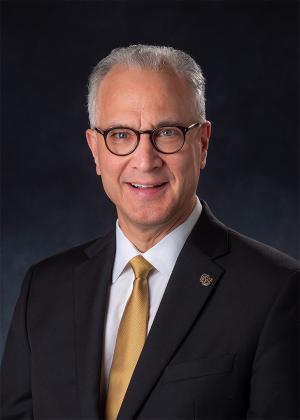Staff Council discusses fall return to campus with President Kennedy
With fall’s return to campus approaching, CU President Mark Kennedy joined the July 16 meeting of the University of Colorado Staff Council (UCSC) to provide an update and take questions from council members.
“I appreciate the good work you do,” Kennedy said during the meeting, which was held remotely via Zoom. CU staff has remained efficient and productive during the pandemic, he said, “and we thank you for your extra effort.”
As faculty and students ready to return to the four campuses next month, Kennedy acknowledged that “there’s clearly going to need to be some degree of coming back to work” for many staff. Others, though, who in March moved to remote working for most or all of their responsibilities should expect to continue in that mode.
“To the extent you can deliver and be productive while working remotely, great,” Kennedy said. “That’s still the modus operandi.”
When asked if remote working would remain in widespread use even after the pandemic has ended, Kennedy said such decisions will be made at the campus level.
“At 1800 Grant, I fully expect some of our employees post-pandemic will be working exclusively from home, while some will be splitting their time between home and office,” Kennedy said. “There’s not a resistance from the system toward the campuses exploring those options.”
Kennedy said he expects work units will undergo facility usage studies, such as one taking place at 1800 Grant St. Office sharing and hoteling are likely to grow more common. Current budget pressures don’t allow for efficiency-improving remodeling projects, which may eventually be feasible.
Kennedy provided an overview of back-to-fall preparations being made at the campuses, highlighting what the four chancellors presented to the Board of Regents last week. Testing and tracing will be ongoing, and campuses are making arrangements to allow for isolation of students who must be quarantined.
“There have been and there will be positive (COVID-19) cases on the campuses,” Kennedy said. “The only question is, if whatever happens grows beyond our ability to test, trace and isolate, would we need to move back to closing down campuses? We’re hoping that isn’t the case.
“We’re in a far better position than we were at the start of the pandemic, but we recognize that only foolish people would make plans set in stone during this very turbulent time. We’re prepared to adjust.”
As for furloughs now under way across the system, Kennedy said uncertainty over enrollment and other coronavirus-related factors make it difficult to say whether furlough durations might be reduced or extended.
“Some of the full-time furloughs will likely be lifted in the weeks and months ahead,” he said.
Kenney also reviewed recent activity at the system and campus levels pertaining to diversity, equity and inclusion. He said university leadership will more frequently report on the topic at meetings of the Board of Regents; in August, he’ll issue a compendium of activities, decisions and actions already taken as well as future goals. Diversity, equity and inclusion is one of four pillars of the president’s strategic planning process, which was paused at the onset of the pandemic but which is resuming presently.


